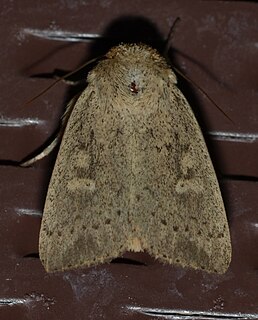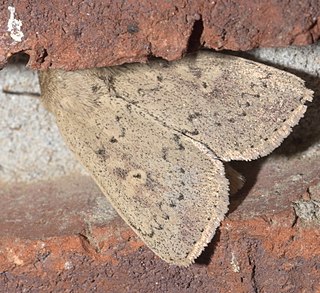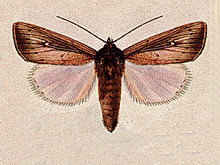
The shoulder-striped wainscot is a moth of the family Noctuidae. The species was first described by Carl Linnaeus in 1761. Some authors place it in the genus Mythimna. It is found throughout Europe and in Russia to the west of the Urals.
Wainscot is a wooden panelling applied to an interior wall.

Leucania obsoleta, the obscure wainscot, is a moth of the superfamily Noctuoidea. The species was first described by Jacob Hübner in 1803. It is found in Europe.

Leucania is a genus of moths of the family Noctuidae first described by Ferdinand Ochsenheimer in 1816.

Leucania loreyi, the cosmopolitan, false army worm or nightfeeding rice armyworm, is a moth of the family Noctuidae. It is found in most of African countries, the Indo-Australian subtropics and tropics of India, Sri Lanka, Myanmar, the eastern Palearctic realm, and the Near East and Middle East. The species was first described by Philogène Auguste Joseph Duponchel in 1827.
Pherne subpunctata is a species of geometrid moth in the family Geometridae. It is found in North America.
Leucania commoides, the comma wainscot or two-lined wainscot moth, is a species of cutworm or dart moth in the family Noctuidae. It was described by Achille Guenée in 1852 and is found in North America.
Leucania multilinea, the many-lined wainscot, is a species of cutworm or dart moth in the family Noctuidae. It is found in North America.
Leucania linita, the linen wainscot moth, is a species of cutworm or dart moth in the family Noctuidae. It is found in North America.
Leucania oaxacana is a species of cutworm or dart moth in the family Noctuidae. It is found in North America.

Leucania inermis, the unarmed wainscot, is a species of cutworm or dart moth in the family Noctuidae. It is found in North America.
Leucania insueta, the heterodox wainscot moth, is a species of cutworm or dart moth in the family Noctuidae. It is found in North America.
Leucania subpunctata, known generally as the white-dotted wainscot or forage armyworm moth, is a species of cutworm or dart moth in the family Noctuidae. It is found in North America.
Leucania senescens is a species of cutworm or dart moth in the family Noctuidae. It is found in North America.

Leucania farcta, the meadow wainscot moth, is a species of cutworm or dart moth in the family Noctuidae. It is found in North America.

Leucania incognita is a species of cutworm or dart moth in the family Noctuidae first described by William Barnes and James Halliday McDunnough in 1918. It is found in North America.

Leucania adjuta, the adjutant wainscot, is a species of cutworm or dart moth in the family Noctuidae. It is found in North America.

Leucania ursula, the ursula wainscot, is a species of cutworm or dart moth in the family Noctuidae. It is found in North America.
Leucania venalba is a moth of the family Noctuidae first described by Moore in 1867. It is found in Indo-Australian tropics of India, Sri Lanka, to Fiji and New Caledonia.
This page is based on this
Wikipedia article Text is available under the
CC BY-SA 4.0 license; additional terms may apply.
Images, videos and audio are available under their respective licenses.









